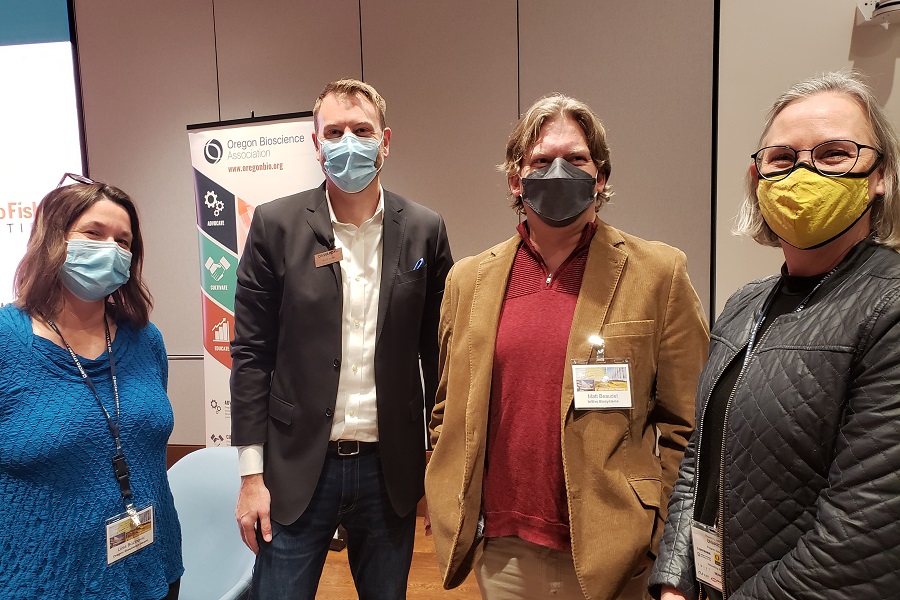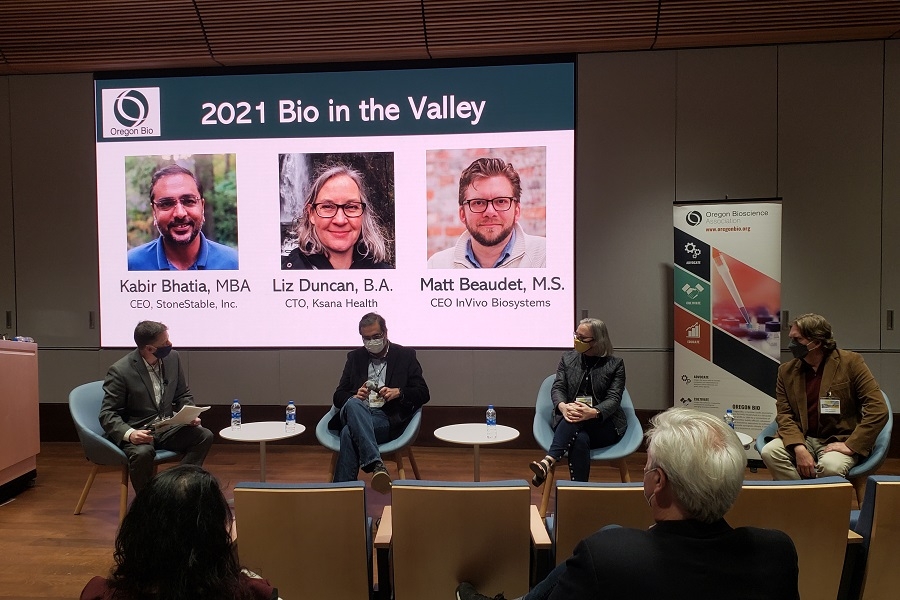The Eugene-based business accelerator and the bioscience association plan to turn Eugene into the state’s bioscience startup hub.
On Thursday Onward Eugene, a business nonprofit dedicated to fostering entrepreneurship in Oregon’s third largest city, announced a memorandum of agreement (MOU) with the Oregon Bioscience Association to monitor and advance the bioscience sector in Lane County.
The announcement was made at a panel discussion and networking event called “Bio in the Valley” at theUniversity of Oregon’s Phil and Penny Knight Campus for Accelerating Scientific Impact hosted by the Bioscience Association.
The two organizations aim to foster a startup-friendly environment in Eugene by connecting Eugene-based entrepreneurs and business consultants with students and professors working on projects in bioscience. The agreement also involves increasing awareness of the bioscience industry in the region, hosting regular programming events and measuring the regional economic impacts of the bioscience sector.
Completed in 2020, the Knight Campus has a 6,000-square-foot innovation center that is available for lease by biotech startups and others , making it a welcoming home base for the joint venture. The key to the project’s success, according to panelists who spoke at the announcement, will be the development of an internship-to-employment pipeline for University of Oregon students.

Left to right: Liisa Bozinovic (Oregon Bio), Matt Sayer (Onward Eugene), Matt Beaudet (InVivo) and Liz Duncan (Ksana Health). Photo: Sander Gusinow.
According to panelists at the event, talent is the most valuable resource in the bioscience sector.
“Hiring talent is the biggest challenge in the industry right now,” says Liz Duncan, CTO of health-monitoring startup Ksana Health. “Even if the intern doesn’t end up coming to work for us, it means we’ve strengthened the industry in the region.”
The campus will also serve as the location for the partnership’s programming. Students and scientists will find industry-informed seminars on how to get their startups funded. Entrepreneurs will find ways to connect with the University of Oregon and opportunities to plug into the school’s internship program.
The bioscience sector, an umbrella term referring to industries that build and manipulate living cells in its products, and includes advancements in cold-storage, pharmaceuticals, agricultural products and more, is relatively new to the business landscape. But it has already found opportunities for growth in Oregon.
A 2019 economic impact study valued Oregon’s bioscience sector at $10.7 billion, employing 47,238 Oregonians and providing $1.5 billion in wages across 820 businesses. But even more interesting has been the sector’s rapid growth. Between 2002-2017, the number of bioscience employees in Oregon increased 72%.
The industry has continued to develop. Bioscience company Genentech completed a $175 million, 130,000-square-foot expansion to its Hillsboro facility in 2020. Thermo Fisher Scientific, one of the world’s leading bioscience companies, already has three locations in the state.
Portland State and Oregon Health and Science University have also begun collaborations with bioscience companies.
But some industry leaders claim Lane County’s talent pipeline makes it better-suited to the biotech capital of the region.
“There are two major companies that act as talent vacuums in Portland,” says Kabir Bhatia, CEO of StoneStable, a nanotechnology company specializing in stabilizing vaccines, who spoke at the announcement. “There is a lot of good work coming out of Nike and Intel, but when it comes to startups, they make it an over-competitive environment.”
For entrepreneurs looking to do business in the bioscience sector Matt Beaudet, CEO of InVivo Biosystems, says that flexibility and adaptability are the hallmarks of bioscience companies. The research applications are so new, the entire aim of bioscience startups can shift rapidly with discovery.
“As a bioscience company, we change what we do every four to eight months,” he jokes.
The bioscience sector is still in its infancy leaving a great deal of room for those wanting to make a mark.
“There’s no federal code yet for the bioscience industry,” says Liisa Bozinovic, executive director, Oregon Bioscience Association.
“We’re not just building a new system, we’re creating a new category,” says Duncan.
To subscribe to Oregon Business, click here.







